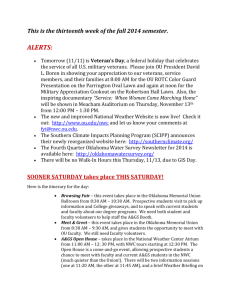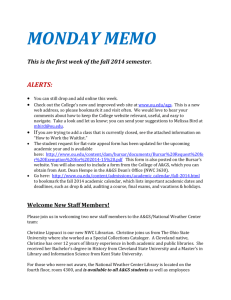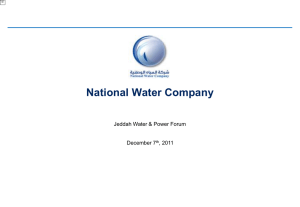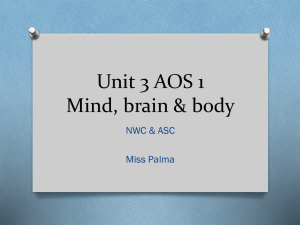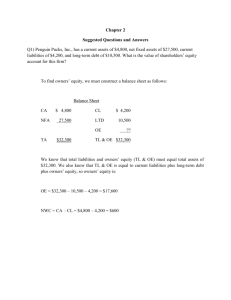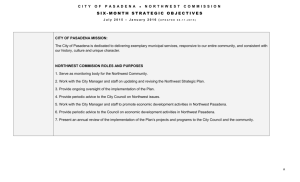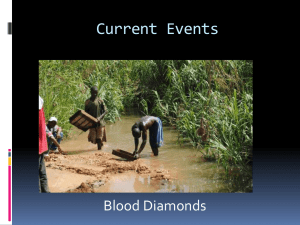CSIRO Submission to the COAG Review of the National Water
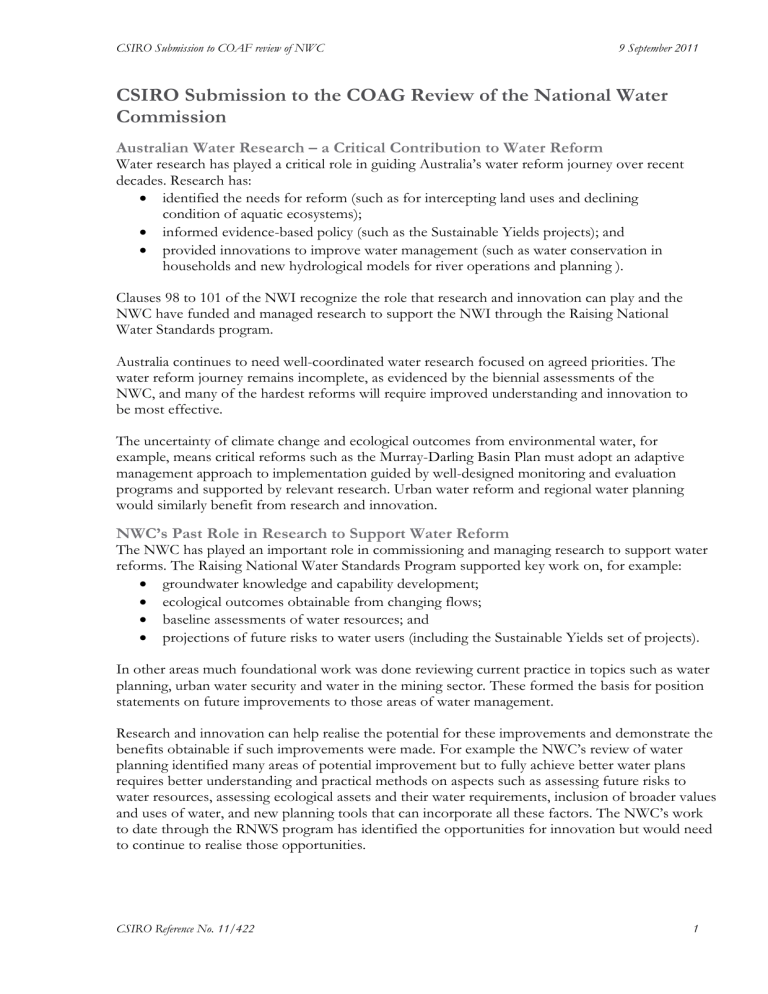
CSIRO Submission to COAF review of NWC 9 September 2011
CSIRO Submission to the COAG Review of the National Water
Commission
Australian Water Research – a Critical Contribution to Water Reform
Water research has played a critical role in guiding Australia’s water reform journey over recent decades. Research has:
identified the needs for reform (such as for intercepting land uses and declining condition of aquatic ecosystems);
informed evidence-based policy (such as the Sustainable Yields projects); and
provided innovations to improve water management (such as water conservation in households and new hydrological models for river operations and planning ).
Clauses 98 to 101 of the NWI recognize the role that research and innovation can play and the
NWC have funded and managed research to support the NWI through the Raising National
Water Standards program.
Australia continues to need well-coordinated water research focused on agreed priorities. The water reform journey remains incomplete, as evidenced by the biennial assessments of the
NWC, and many of the hardest reforms will require improved understanding and innovation to be most effective.
The uncertainty of climate change and ecological outcomes from environmental water, for example, means critical reforms such as the Murray-Darling Basin Plan must adopt an adaptive management approach to implementation guided by well-designed monitoring and evaluation programs and supported by relevant research. Urban water reform and regional water planning would similarly benefit from research and innovation.
NWC’s Past Role in Research to Support Water Reform
The NWC has played an important role in commissioning and managing research to support water reforms. The Raising National Water Standards Program supported key work on, for example:
groundwater knowledge and capability development;
ecological outcomes obtainable from changing flows;
baseline assessments of water resources; and
projections of future risks to water users (including the Sustainable Yields set of projects).
In other areas much foundational work was done reviewing current practice in topics such as water planning, urban water security and water in the mining sector. These formed the basis for position statements on future improvements to those areas of water management.
Research and innovation can help realise the potential for these improvements and demonstrate the benefits obtainable if such improvements were made. For example the NWC’s review of water planning identified many areas of potential improvement but to fully achieve better water plans requires better understanding and practical methods on aspects such as assessing future risks to water resources, assessing ecological assets and their water requirements, inclusion of broader values and uses of water, and new planning tools that can incorporate all these factors. The NWC’s work to date through the RNWS program has identified the opportunities for innovation but would need to continue to realise those opportunities.
CSIRO Reference No. 11/422 1
CSIRO Submission to COAF review of NWC 9 September 2011
Current Status of Water Research in Australia
Currently, water research in Australia is fragmented, ill coordinated, often poorly linked into policy and poorly linked to the long-term need for new capability in the water sector (as observed by the
NWC, the Australian Academy of Technological Science and Engineering and SEWPaC among others). The outcome is inefficient and poorly accountable public investment in research.
Furthermore, government investment in water research is reducing significantly at a time when the need has never been greater. Australian Government investment in water research (excluding DSIIR block grants) stood at around $68m in 2009/10 and is estimated to be now less than half of this at around $32m in 2011/12; by 2014/15 current ongoing commitments will be only $10m (Figure 1).
One of the contributing factors to the decline in Australian Government funding of water research is the forthcoming conclusion to NWC funding under the Raising National Water Standards program. This is coincident with other influential Australian Government programs for research that have finished or soon will, including Land and Water Australia and the CRC program, which at its peak supported five water related CRCs but soon will support none.
80
70
60
50
40
30
20
10
0
2005/06 2006/07 2007/08 2008/09 2009/10 2010/11 2011/12 2012/13 2013/14 2014/15
Year
Figure 1. Changing levels of Australian Government investment in research to guide water reform.
Several initiatives have provided some level of coordination for particular issues (e.g. the Goyder
Institute, the TRaCK Program, WIRADA, MDFRC, various CRCs, SEQ UWSRA, NCGRT,
GISERA and a number of centres of excellence) but none of these provides a vehicle to coordinate across all the different research efforts in the national innovation system and none are focussed specifically on supporting water reform. The majority of these current agreements cease within 24 months.
There have been several calls in the past for a national water research strategy. In 2008 the
National Water Commission recommended that “COAG initiate a national water science strategy to guide science efforts in the water sector. In 2009 NWC recommended that the
“jurisdictions collaborate in the development of national water science strategy”. The past CEO of the NWC was a vocal advocate for a national approach that provides: clearer strategy, improved resource allocation, more coherent institutional arrangements (reduced fragmentation), improved governance and greater role clarity in the sector.
CSIRO Reference No. 11/422 2
CSIRO Submission to COAF review of NWC 9 September 2011
In 2009 COAG requested DSEWPaC prepare a “national water knowledge and research strategy”. This has been progressed by DSEWPaC over the last two years who have consulted with CSIRO along with many other groups including relevant state agencies. The latest draft of the strategy identifies six broad research themes and some early thoughts on implementation. As yet the document does not give a clear view of the strategic need for research and does not canvass important implementation issues including adoption, consultation and communication strategies; skills and capacity building requirements; governance models; and funding options and budget.
NWC’s Potential Future Role in Research to Support Water Reform
A national framework is required to guide water science over the coming decades should include four main elements:
Identify challenges or research priorities;
Engage and support the research capability, people and infrastructure required;
Facilitate knowledge exchange between those undertaking water reform and those providing the research and innovation; and
Appropriate, resourcing, governance and program management arrangements.
NWC, through the Raising National Water Standards program, has had some success in providing these elements. It is a model to which further improvements could be made to provide the research and innovation required to support effective water reform. NWC has a degree of independence from the governments implementing the reforms and thus can play a strong and independent role in facilitating research that provides the evidence to support the reforms and make their implementation most effective. There is a close link between the NWC’s audit function and provision of the evidence base for the effectiveness and need for water reform, especially in the context of adaptive management. The NWC’s relative independence allows the NWC to support knowledge exchange to foster innovation between various stakeholders in water management.
The NWC has a proven track record in program management through the RNWS program. It has been successful at combining the Australian Government’s funding with additional resources from water management agencies and the National Innovation System. It has an appropriate level of independent governance and has used a committee structure successfully to pull together stakeholders and funders of the work.
For research agencies such as CSIRO, the NWC has played an important role in helping present research findings to end users in appropriate and accessible forms that facilitate broad exposure to the research. This is an important contribution to fostering the adoption of new tools and approaches, and thus for research organisations, NWC has been an important “path to impact” partner in water management. Without this national level coordination and brokering the link between water research and water reform will weaken at a time when it needs to strengthen.
There are significant transaction costs in coordinating research and knowledge exchange across the many relevant stakeholders and the outcomes of research are of public value and are rarely exclusive to the funding party. Thus without a well-planned and resourced national plan the individual stakeholders have insufficient incentive to self organise the coordination and the existing fragmented approach will continue, producing declining outcomes. The NWC is best placed to meet the widely recognised need for the national coordination of a water research agenda.
CSIRO Reference No. 11/422 3
CSIRO Submission to COAF review of NWC 9 September 2011
CSIRO Reference No. 11/422 4
